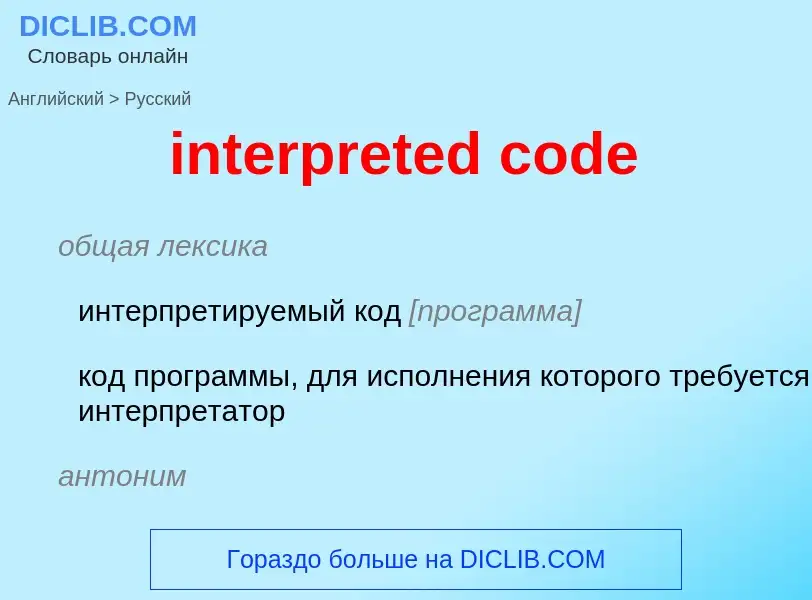Traduction et analyse de mots par intelligence artificielle ChatGPT
Sur cette page, vous pouvez obtenir une analyse détaillée d'un mot ou d'une phrase, réalisée à l'aide de la meilleure technologie d'intelligence artificielle à ce jour:
- comment le mot est utilisé
- fréquence d'utilisation
- il est utilisé plus souvent dans le discours oral ou écrit
- options de traduction de mots
- exemples d'utilisation (plusieurs phrases avec traduction)
- étymologie
interpreted code - traduction vers Anglais
общая лексика
интерпретируемый код [программа]
код программы, для исполнения которого требуется интерпретатор
антоним
Смотрите также
Définition
Wikipédia

In computer science, an interpreter is a computer program that directly executes instructions written in a programming or scripting language, without requiring them previously to have been compiled into a machine language program. An interpreter generally uses one of the following strategies for program execution:
- Parse the source code and perform its behavior directly;
- Translate source code into some efficient intermediate representation or object code and immediately execute that;
- Explicitly execute stored precompiled bytecode made by a compiler and matched with the interpreter Virtual Machine.
Early versions of Lisp programming language and minicomputer and microcomputer BASIC dialects would be examples of the first type. Perl, Raku, Python, MATLAB, and Ruby are examples of the second, while UCSD Pascal is an example of the third type. Source programs are compiled ahead of time and stored as machine independent code, which is then linked at run-time and executed by an interpreter and/or compiler (for JIT systems). Some systems, such as Smalltalk and contemporary versions of BASIC and Java may also combine two and three. Interpreters of various types have also been constructed for many languages traditionally associated with compilation, such as Algol, Fortran, Cobol, C and C++.
While interpretation and compilation are the two main means by which programming languages are implemented, they are not mutually exclusive, as most interpreting systems also perform some translation work, just like compilers. The terms "interpreted language" or "compiled language" signify that the canonical implementation of that language is an interpreter or a compiler, respectively. A high-level language is ideally an abstraction independent of particular implementations.



![A portion of the "[[Zimmermann Telegram]]" as decrypted by [[British Naval Intelligence]] codebreakers. The word ''Arizona'' was not in the German codebook and had therefore to be split into phonetic syllables. A portion of the "[[Zimmermann Telegram]]" as decrypted by [[British Naval Intelligence]] codebreakers. The word ''Arizona'' was not in the German codebook and had therefore to be split into phonetic syllables.](https://commons.wikimedia.org/wiki/Special:FilePath/Ztel2.jpg?width=200)
![The Napoleonic Code in the [[Historical Museum of the Palatinate]] in [[Speyer]] The Napoleonic Code in the [[Historical Museum of the Palatinate]] in [[Speyer]]](https://commons.wikimedia.org/wiki/Special:FilePath/Speyer (DerHexer) 2010-12-19 051.jpg?width=200)
